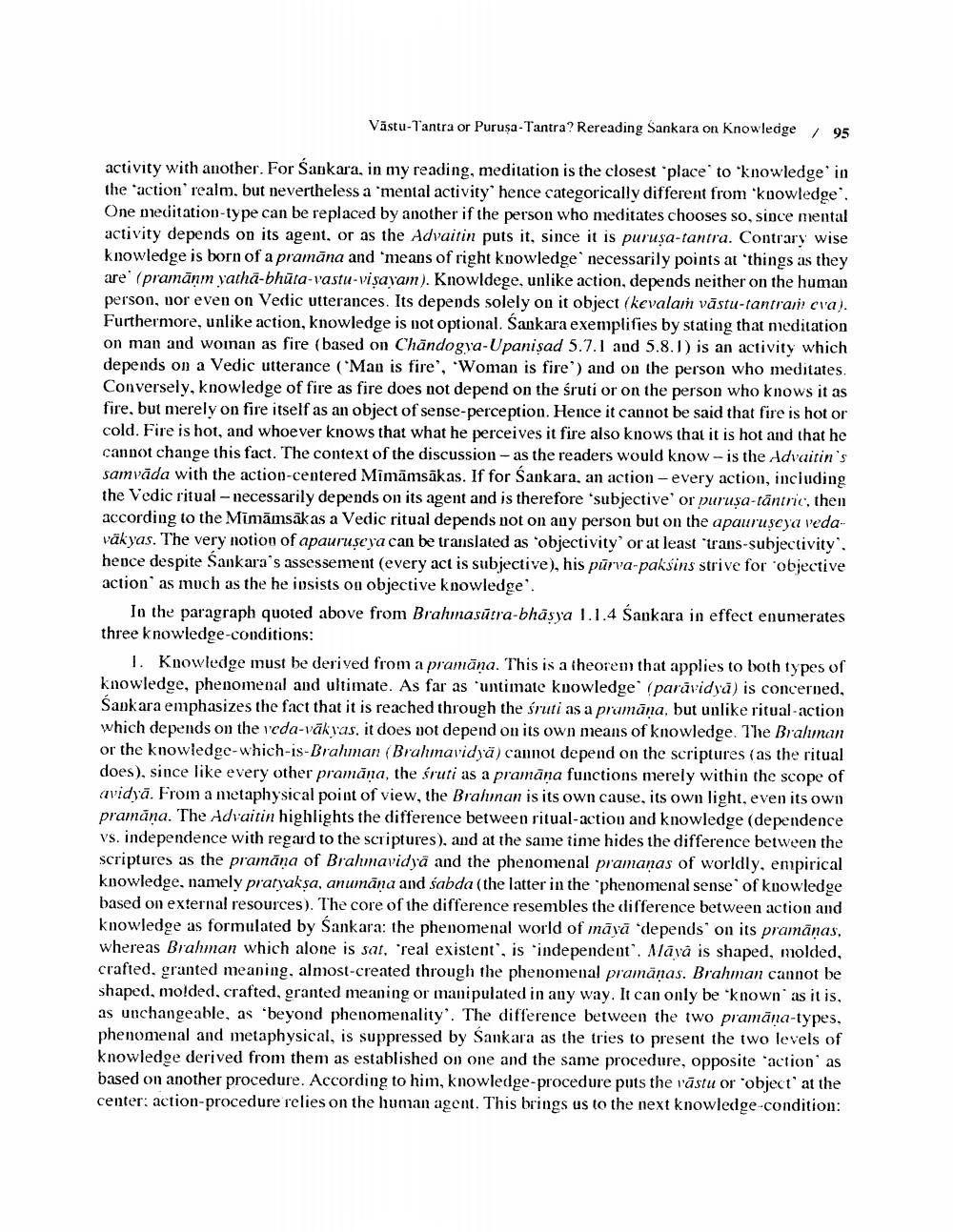________________
Västu-Tantra or Purusa-Tantra? Rereading Sankara on Knowledge/95
activity with another. For Sankara, in my reading, meditation is the closest place to knowledge in the action realm. but nevertheless a 'mental activity hence categorically different from koowledge'. One meditation-type can be replaced by another if the person who meditates chooses so, since mental activity depends on its agent, or as the Advaitin puts it, since it is puruṣa-tantra. Contrary wise knowledge is born of a pramāna and 'means of right knowledge necessarily points at things as they are (pramanm yatha-bhūta-vastu-visayam). Knowldege, unlike action, depends neither on the human person, nor even on Vedic utterances. Its depends solely on it object (kevalar vāstu-tantram cva). Furthermore, unlike action, knowledge is not optional. Sankara exemplifies by stating that meditation on man and womnan as fire (based on Chandogya-Upanişad 5.7.1 and 5.8.1) is an activity which depends on a Vedic utterance ("Man is fire', 'Woman is fire') and on the person who meditates. Conversely, knowledge of fire as fire does not depend on the śruti or on the person who knows it as fire, but merely on fire itself as an object of sense-perception. Hence it cannot be said that fire is hot or cold. Fire is hot, and whoever knows that what he perceives it fire also knows that it is hot and that he cannot change this fact. The context of the discussion - as the readers would know is the Advaitin's samvāda with the action-centered Mimāmsākas. If for Sankara, an action - every action, including the Vedic ritual - necessarily depends on its agent and is therefore 'subjective or purusa-tantric, then according to the Mimāmsākas a Vedic ritual depends not on any person but on the apauruseya vedaväk yas. The very notion of apauruse ya can be translated as objectivity' or at least "trans-subjectivity hence despite Sankara's assessement (every act is subjective), his pūrva-paksins strive for objective action' as much as the he insists on objective knowledge'.
Io the paragraph quoted above from Brahmasūtra-bhâsya 1.1.4 Sankara in effect enumerates three knowledge-conditions:
1. Knowledge must be derived from a pramāna. This is a theorem that applies to both types of knowledge, phenomenal and ultimate. As far as 'untimate knowledge (parāvidyā) is concerned, Sankara emphasizes the fact that it is reached through the sruti as a promāna, but unlike ritual-action which depends on the veda-vākras, it does pot depend on its own means of knowledge. The Brahman or the knowledge-which-is-Brahman (Brahmavidyā) cannot depend on the scriptures (as the ritual does), since like every other pramāna, the fruti as a pramāna functions merely within the scope of avidyā. From a metaphysical point of view, the Brahman is its own cause, its own light, even its own pramāna. The Advaitin highlights the difference between ritual-action and knowledge (dependence vs. independence with regard to the scriptures), and at the same time hides the difference between the scriptures as the pramāņa of Brahmavidya and the phenomenal pramaņas of worldly, empirical knowledge, namely pratyaksa, anumāna and sabda (the latter in the phenomenal sense of knowledge based on external resources). The core of the difference resembles the difference between action and knowledge as formulated by Sankara: the phenomenal world of māvā depends on its pramānas, whereas Brahman which alone is sat, 'real existent', is 'independent'. Mává is shaped, molded, crafted, granted meaning, almost-created through the phenomenal pramanas. Brahman cannot be shaped, molded, crafted, granted meaning or manipulated in any way. It can only be known as it is, as unchangeable, as 'beyond phenomenality'. The difference between the two pramāna-types, phenomenal and metaphysical, is suppressed by Sankara as the tries to present the two levels of knowledge derived from them as established on one and the same procedure, opposite 'action' as based on another procedure. According to him, knowledge-procedure puts the lāstu or object' at the center: action-procedure relies on the human agent. This brings us to the next knowledge-condition:




